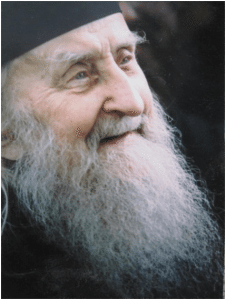|
Elder Sophrony (Sakharov) of Essex was born in Russia in 1896, but departed as a young man in 1921 for the intellectual and artistic hubs of Europe. He finally settled in Paris where he found success as an artist. During this time, he engaged in the practices of oriental mysticism. These were years of struggle as he searched for eternal beauty beyond the realities of time and space. Art was his way of accessing the spiritual experiences he had long desired. After some time, he returned to Christianity and became one of the first students of the Orthodox Theological Institute in Paris. His calling to monasticism followed, and he moved to Mt Athos where he joined the Russian monastery of St Panteleimon. It was there that he met St Silouan, the man who would teach him humility, prayer, repentance, ascetic obedience and love for the whole world. Fr Sophrony remained the disciple of St Silouan until the Elder’s repose in 1938. The young monk then left the monastery under obedience to take up residence in the Athonite desert. After a brief return to Paris, he established himself in Essex, England, at the monastery he founded in 1959.
Elder Sophrony wrote seven books, including the life and teachings of St Silouan: a true masterpiece that provides a glimpse into the life and teachings of a 20th century Saint. He also wrote extensively on many spiritual topics, including his experiences in the Uncreated Light, mindfulness of death, the deification of man and spiritual mourning. He was a theologian who lived the truth of his teachings. His writings reveal a man who struggled for the pure and undefiled experiences of the spiritual life. A man with depth of insight, acute understanding and a highly developed intellect is present in his remarkable writings, though the humility of the meek monk is never hidden. It is in regard to prayer that Elder Sophrony is an exceptional guide. For the Elder, prayer is a creative effort, far superior to any form of art or science. It is the means by which we enter into communion with God, our Creator. It is a bridge between our all-loving Creator and His creation. The Elder does acknowledge that often, prayer can be difficult. “At times prayer seems over-slow in bringing results” the Elder sympathises, “and life is so short”. However, he highlights that prayer must initially stem from a repentant heart. In particular, we must acknowledge that our sins have created a distance from God, leading us to a state of ‘blessed despair’. We then seek out God, in a way “by force” (Matthew 11:12), travelling “the hard road of ascetic effort for the Divine gift to grow in us. And when this wondrous gift starts to ripen and its fragrance penetrates the pores of our ‘body of sin’ (Rom 6:6), the fear of death departs and we are delivered from bondage. And in the holy freedom thus found, we wish all men well”. In other words, it is with a repentant heart that we feel the spirit of prayer and reap its fruits. For the Elder, prayer is not simply an act done by obligation. It is an experience yearned for and relied upon for our minds to rise to God, and there be comforted and guided. Source: Lychnos
0 Comments
Leave a Reply. |
Categories
All
|

 RSS Feed
RSS Feed
